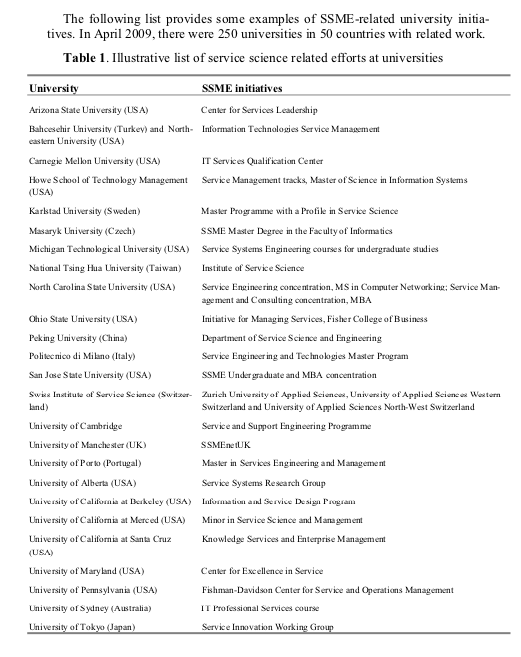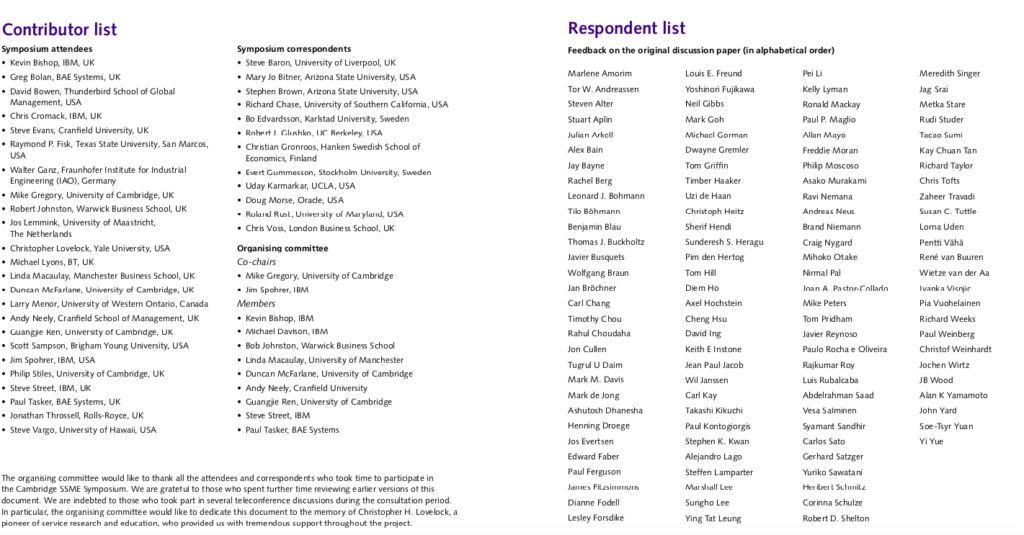Motivation:
People from around the world email me every week, asking about “service/systems/innovation degrees and certifications.” Their questions range from (1) where to get a PhD/Masters/Bachelors as a fulltime student, to (2) same, but as a remote, working professional, part-time students, to (3) short-term, certification or certificate of completion for one week workshop, attending a few day conference, or full or have day tutorial at a conference. Next they want to know how long it will take and estimated cost of such a program, and if there is an email address or URL to take next steps to get more information. Finally they ask for a textbook recommendation or one book they could easily purchase and read to start preparing to apply to programs to get needed degree or certifications. Some ask if there are any online courses from Coursera or Udacity that I could recommend.
Traditional response:
In response to these queries, I have a short list of universities (by country) and textbooks that I usually point people to…. However, I would like to do better than that.
Better response:
To do better my first thought was to have ISSIP design a survey, and then email members and colleagues to try to collect the first draft version of the information more systematically. Compiling an ISSIP guide to service/systems/innovation degrees and certifications seems to be worth investigating a bit… Then realized maybe someone or some organization has already done this in part or completely…
Questions:
(1) Has this already been done? What is best that exists?
(2) Needs to be done? Would below be an OK first pass survey?
Proposed Survey:
Survey estimated time to complete 20 minutes if your institutions offers service/systems/innovation degrees or certifications:
Definition (casting a wide net, since it is a big tent): A “service/systems/innovation degree or certification” includes a service-related emphasis with a specialized expert teaching/research faculty or instructors for traditional academic degrees such as design, marketing, management, engineering, operations, economics, computing, web services, information systems, industrial engineering, operations research, analytics, decision-making, data sciences, artificial intelligence, law, public policy, anthropology, humanities, ethics, leadership, entrepreneurship, innovation, open innovation, complex systems, sustainable systems, or other traditional or non-traditional degree or certification. The faculty or instructors for these programs may be from academia or from industry, government, or other areas of practice or industrial research or professional development. The expert instructors must have distinguished themselves, in some way such as: (a) publications in service/systems/innovation research literature, (b) positions of responsibility and distinction in business, government or practice, or (c) some other form of professional success.
For “service/systems/innovation degree or certification” as defined above…
- Degrees/Certifications: For your institutions, please indicate which of these are granted:
(a) PhD degree
(b) Masters degree
(c) Bachelor degree
(d) Associate degree
(e) Certificate of Completion, Certification, or Badge
(f) Other - Student Options: For each of the above selected, indicate student options…
(a) PhD degree – full-time, night-school (working professional), remote students, online
(b) Masters degree – full-time, night-school (working professional), remote students, online
(c) Bachelor degree – full-time, night-school (working professional), remote students, online
(d) Associate degree – full-time, night-school (working professional), remote students, online
(e) Certificate of Completion, Certification, or Badge – full-time, night-school (working professional), remote students, online
(f) Other – full-time, night-school (working professional), remote students, online - Time, Cost: Please indicate estimated time to complete and cost
(a) PhD degree- time (years), cost ($)
(b) Masters degree- time (years), cost ($)
(c) Bachelor degree- time (years), cost ($)
(d) Associate degree — time (years), cost ($)
(e) Certificate of Completion, Certification, or Badge – time (months, weeks, days, hours, as appropriate), cost ($)
(f) Other – time (years, months, weeks, days, hours, as appropriate), cost ($) - Center: For your institution, do you have an existing center of excellence with service/systems/innovation related research, and if so is there a URL?
(a) Yes, name:
(b) Yes, URL:
(c) No
(d) Other - Textbook: Do you recommend a specific textbook or book for students preparing to get a degree/certification, and if so is there a URL?
(a) Yes, name:
(b) Yes, URL:
(c) No
(d) Other - Workshops/Conferences: Do you recommend a specific workshop or conference that students/professionals can attend to get a certificate of completion, certification, badge, etc., and is so is there a URL?
(a) Yes, name:
(b) Ues, URL:
(c) No
(d) Other - Can you recommend institutions or people to contact to survey?
(a) Suggestion 1:
(b) Suggestion 2:
(c) Suggestion 3:
(d) Other - Are you an ISSIP member? If so, would you like to see an annual ISSIP Guide to Service/Systems/Innovations Degrees and Certifications?
(a) Yes member, Yes like to see annual guide
(b) Yes member, No need for annual guide
(c) No, not a member
(d) Other - Any final thoughts, or comments?
(a) Comments:
From Handbook of Service Science diagram:


Example of a well-designed anthropology online Masters from University of North Texas: http://anthropology.unt.edu/graduate/online-masters-program
Others can be found here: https://www.guidetoonlineschools.com/degrees
SERVSIG lists these: http://www.servsig.org/wordpress/teaching/services-marketing-syllabi/